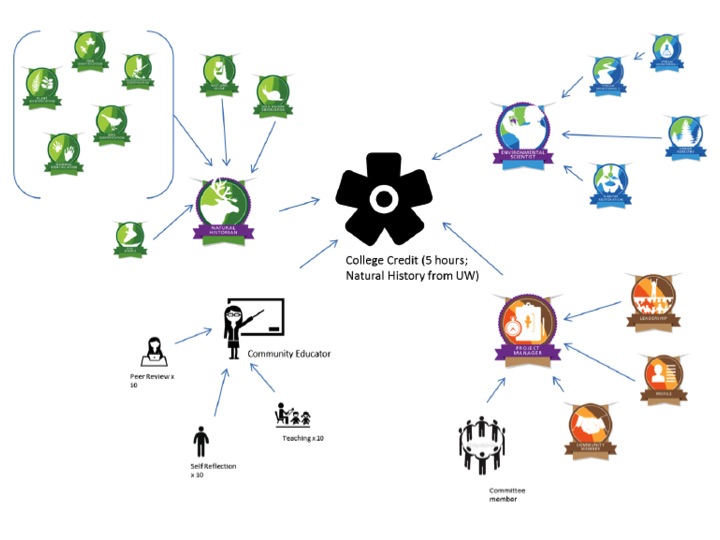In this four-year research project, funded by the National Science Foundation, the University of Washington Bothell is partnering with three of the premier informal science education institutions in the Washington State Puget Sound area: Mercer Slough Environmental Education Center and Pacific Science Center, the Future of Flight, and the Seattle Aquarium, to design and study a badge system that leads to college credit at the University of Washington Bothell. We partner with faculty and program developers to combine college-level science work, a badge system with learning pathways, with the learning objectives of each program. High school youth who successfully complete an informal learning program are awarded transferable college credit.
The co-design process with Youth Ocean Advocates at the Seattle Aquarium
Written by Lindsy Myers, one of the youth badge designers
As a high school student, my ambition to stand out and pursue unique opportunities only seems to continue to grow. Upon receiving an email from the Youth Ocean Advocate program mentor, Dave Glenn, regarding this amazing opportunity to be a part of an integration between technology and volunteer work, I was intrigued. As I responded with an excited “count me in!” I took a few minutes to consider the change that this may encourage at the Aquarium. Any member of the Puget Sound Region is familiar with the “tech boom” the City of Seattle is facing, and the innovations that it is bringing to our community.
Whether it be physical construction or updating the technology, the Seattle Aquarium is catching up with the innovation and making progress with it’s many phenomenal programs. A welcomed addition to the Youth Ocean Advocate program is this idea of virtual badges to track the accomplishments of the many youth that participate in the daily activities with the goal of achieving possible college credit. Though, yes, the point of volunteering is to give without getting, the badging system is a way for the hard work from the dedicated teens at the Seattle Aquarium to benefit their future academics and allow each individual to reflect on their work with the touch of a keyboard.
The process of designing the badges was abstract, limitless, and truly tailored toward the Seattle Aquariums youth. As a small group of fellow youth and I divulged in the designing of these badges every Wednesday for two hours, the potential and excitement for the system continued on a positive trend. After sitting in a classroom all day with specific criteria to each and every assignment, being able to start from nothing with the only guidance being “oh yes you guys are doing great” and “I like that idea” or “how can we delve into that topic further, in your opinion?” was extremely refreshing. From beginning to end, the design process of the badges was authentic and creative. As the design process approached the launch date, it was decided by myself and my fellow youth that we would hold a series of workshops at the Seattle Aquarium for the other youth within the program to share our ideas, listen to feedback, and invite others to join us in the continuation of the design process.
The success of these workshops was immeasurable in the design process because each individual was able to readily share their thoughts and concerns with an audience that emulated each others passion. The culmination of each workshop and meeting to design the badges that will soon provide endless opportunity to the Youth Ocean Advocate process, is an unforgettable part of my time volunteering at the Seattle Aquarium.


